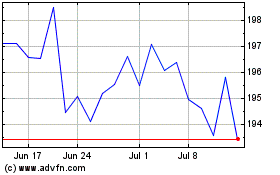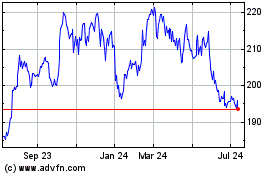US Regulators To Testify On Swaps Rules
April 12 2011 - 3:15PM
Dow Jones News
A senior U.S. Treasury official said the Treasury wants to "move
expeditiously" to determine whether to exempt foreign exchange
swaps and forwards from new regulations governing over-the-counter
derivatives transactions.
"Regardless of the decision the secretary pursues, market
participants need to know what the regulatory regime will look like
and to be able to plan and prepare for that regime," Assistant
Treasury Secretary Mary J. Miller will say in prepared remarks
before the U.S. Senate Banking Committee on Tuesday.
Last year's Dodd-Frank law aims to push over-the-counter
derivatives transactions onto trading platforms and route them
through clearinghouses, which guarantee trades. Today, swaps are
mostly customized transactions between two counterparties conducted
away from regulatory scrutiny. The law gives the Treasury secretary
authority to exempt all foreign exchange swaps and forwards from
the new regulations.
Miller, in her prepared testimony, will argue U.S. regulators
charged with implementing the new law, including the derivatives
provisions, must ensure the new rules don't undermine the
competitiveness of U.S. financial markets and can't be "evaded or
rendered ineffective by lax standards elsewhere."
Federal Reserve Governor Daniel K. Tarullo will echo those
remarks in his prepared testimony. "Our aim is to promote both
financial stability and fair competitive conditions to the fullest
extent possible," he will say.
Tarullo argues that a provision of the Dodd-Frank law requiring
banks to transfer certain types of swaps out of their subsidiaries
and into separate legal entities could cause unintended
consequences. The law provides an exemption from the so-called
"push-out provisions" for U.S. banks engaging in traditional
derivatives activities, including hedging. But Tarullo notes in his
testimony that the exemption doesn't cover U.S. branches of foreign
banks.
The provision may "require some foreign firms to reorganize
their existing U.S. derivatives activities to a greater extent than
U.S. firms," Tarullo will argue.
Securities and Exchange Commission Chairman Mary Schapiro will
discuss the challenges of meeting the Dodd-Frank law's deadlines
for issuing derivatives regulations in her prepared testimony. "The
OTC derivatives markets are large and interconnected. The issues
are complex and do not lend themselves to easy solutions," she will
say.
The SEC is looking closely at how the rules affect contracts
that existed before the Dodd-Frank law and will work to ensure that
final rules are issued in the proper sequence to give market
participants time to comply, Schapiro will say.
"We understand that getting the rules right and implementing
them in the right order is important, and this will guide our
efforts in coming months," she will say.
Industry representatives, in a second panel, will weigh in on
regulators' work so far in implementing the new rules.
CME Group Inc. (CME) Executive Chairman Terrence Duffy, in
prepared remarks, blasts the Commodity Futures Trading Commission
for what he calls the regulator's "almost complete reversion to a
prescriptive regulatory approach." Duffy argues the CFTC has
wrongly applied the Dodd-Frank law to propose specific requirements
for futures regulations that are rooted in core principles.
The regulator has become a "front-line decision maker that
imposes its business judgments on the operational aspects of
derivatives trading and clearing," Duffy will say.
-By Jessica Holzer and Jamila Trindle, Dow Jones Newswires;
202-862-9228; jessica.holzer@dowjones.com
CME (NASDAQ:CME)
Historical Stock Chart
From May 2024 to Jun 2024

CME (NASDAQ:CME)
Historical Stock Chart
From Jun 2023 to Jun 2024
